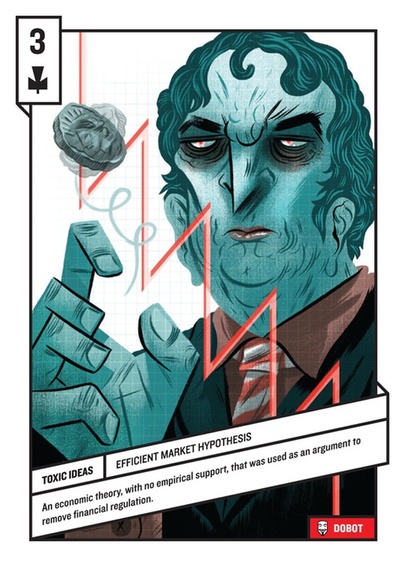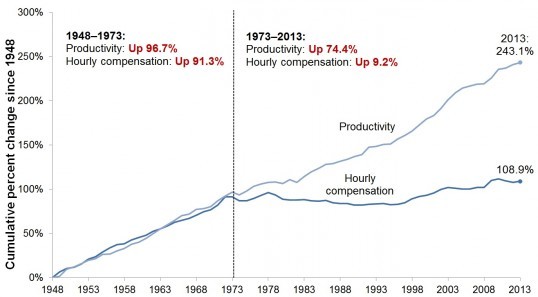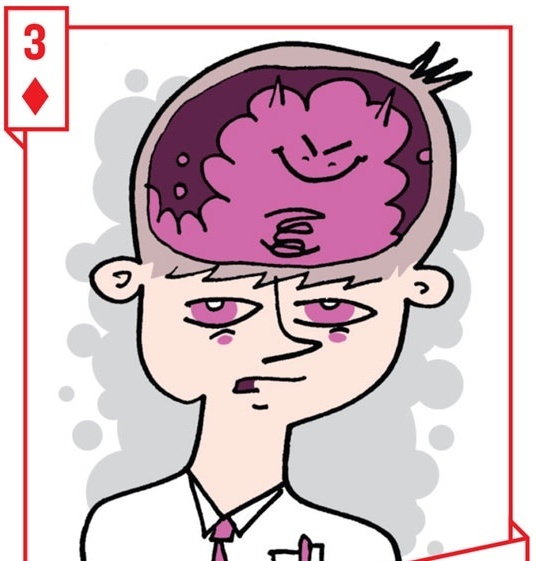Our society is infected by a disease we call "free market ideology". Whatever the problem might be - climate change, poverty, educational reform - free markets are promoted as an answer. We are told that markets are the greatest anti-poverty program, that if we just leave things alone, companies will lift up the poor. Don't worry, we are told, innovation will solve global warming if only we give entrepreneurs the right incentives. Trade agreements are promoted as the solution to spur economic growth both at home and abroad, and privatization will solve governmental inefficiencies. These arguments, however, are based on logical fallacies and a misunderstanding of both economics and history.
We are not arguing that markets are always pernicious - in fact, markets can be very useful. But, the observation that markets are good, in moderation, has been morphed into an extreme ideology that markets are beneficial always and everywhere and that regulating markets is bad. We also don't assert that most people explicitly agree with free market ideology, in its purist form. But, the ideology has permeated public discourse in ways we are not even aware of implicitly influences most public policy. As Yuval Harari has noted, the capitalist myths are that "The answer to all problems,... is economic growth." that "if you have any problem, on the personal level, the solution is to buy something." These implicit beliefs have come to predominate public discourse and policy. That is the way that the disease of free market ideology is infecting us and harming our society.
Free market ideology has so pervaded our culture that we aren't even aware of it. It is incorporated in the very language we use to discuss anything vaguely economic. Education is a good illustration. We used to "nurture" our children and prepare students to be responsible and productive participants in the democracy we claimed to be. Now we "invest" in them and prepare them for the workplace. Many people in the both established parties look to competitive models like charter schools and "choice" to fix everything - even though there's no evidence these actually improve learning. Rather than looking for caring and capable teachers, we want to align their incentives and measure their value-added.
Our reliance on billionaires like Bill Gates or Mark Zuckerberg to reform education is another symptom of the problem. Market ideology has led to a reverence for billionaires on the theory that the ability to accumulate a large pile of dollars is a sign of expertise in all domains. Market ideology has also lead to a funding squeeze leaving public school systems willing to put themselves in the hands of any well-funded "savior" to come along, including McDonald's, rather than raise taxes on the wealthy.
This is a bipartisan ailment. While the Republican party is perhaps more severely infected with free market ideology, the Democratic party is also suffering. President Obama is a strong advocate of a "free trade" agreements and charter schools, as are many other Democrats.
And it's harmful. The free market ideology disease has harmed the country. Because of our diseased mindset, we tolerate poverty and starvation that could be eradicated, tearing apart the fabric of society. We are even destroying the environment to the cost of ourselves and our children.
What is free market ideology?
Free market ideology asserts that markets are always good and government regulation - or even government in general - is always bad. Exceptions are made for the military and the police, and free-market economists concede that there are environmental impacts and other side-effects of markets which they term "externalities". But even then, they dismiss or ignore these imperfections, arguing that the side-effects could be fixed by defining property rights better, or building yet more markets. Only a small minority of people are true ideologues, but a fuzzier version of free market ideology is accepted broadly enough that our political discourse has been taken over. For instance, a market system called "Cap and Trade" is promoted to solve the market-created global warming crisis while concepts such as publicly-funded universal health insurance or increased social welfare programs are dismissed as "socialist."
- Markets create a meritocracy where everyone has an equal opportunity.
- Success goes to those producing the most value for society.
- Given unlimited choice, people will act in their own best interests and to their ultimate benefit.
- Individualistic choices will also maximize growth of the economy as a whole.
- It's good to promote business and growth because "a rising tide lifts all boats"
- Selfishness is glorified, and companies are naturally expected to maximize profits.
- To the extent things are not perfect today, or that growth is stagnant, it is because of government interference in markets.
Indeed, there is ample evidence that opportunity in the modern U.S. is wildly unequal and that therefore, success is not a simple sign of merit. Just as one example, no one would claim that a student who attends a typical school in poor neighborhoods and whose family cannot afford to provide good nutrition has as much chance of being the "next Steve Jobs" as a graduate from an elite school in a wealthy district whose parents provide extra tutoring. If they did, why would parents seek to send their kids to elite schools and provide that extra tutoring? But, the fact that a few poor kids do succeed, against the odds, is taken as evidence that the system is working. The rest of the poor kids just need to be taught to have more grit and they, too, will succeed.

Source: 52 Shades of Greed. Artist: Dobot
Let's face it, the self-made billionaire is a myth. All successful people have benefited from both good fortune and support from society and government. Did Steve Jobs cleverly choose parents who lived in Mountain View, California where he would get good schooling and happen to run into the inventor of the Apple? Would his career have been equally successful if he had been born in Mountain View, Oklahoma? And how successful would he have been if the government and non-profit institutions had not collaborated to create the internet? Is the fact that Silicon Valley billionaires are almost all white men a sign that white men are more meritorious by nature, or is a more likely explanation that they get the opportunities to succeed where others don't?
Also, let's not confuse financial success with social value. While Steve Jobs arguably did benefit society - or at least helped create stuff we like - the value produced by most billionaires is much more ambiguous, at best. What societal contribution has David Koch made by mining dirty coal and oil? Is Jamie Dimon really contributing to society running a bank that has repeatedly admitted to legal misdeeds? How large a social benefit is Uber providing with their long-term strategy of replacing taxi drivers with a monopoly on automated taxis?
A large fraction of billionaires are hedge fund types. What is George Soros's contribution to society? Should we thank John Paulson for betting on a crash in the housing market? And they are not the worst; there are truly predatory hedge fund "entrepreneurs" like Martin Shkreli who is price gouging seriously ill people or the "litigation finance" industry that is preying on women who have been harmed by unnecessary surgery and taking a large fraction of the settlements the women are due. Free market ideologues implicitly argue that all of these billionaires are contributing more to society than they are taking, or else they wouldn't be making a profit, but it's circular and flawed reasoning. In fact they are just leaches, sucking blood out of society.
Markets do not get us what we want.
Another fallacy is that our choices reliably get us what we want. In reality, our choices often lead us astray. The "invisible hand" only operates as desired under a specific set of conditions that are rarely true in real life. Tom Slee's excellent book "No One Makes You Shop at Wal-Mart" describes the many circumstances in which everyone making the best individual choices for themselves end up leading to outcomes that are collectively undesirable (such as ending up with a Walmart on the outskirts of a town with a hollowed-out town center). One of the key assumptions is that one person's choices don't affect others, that we are but individuals voting independently with our shopping habits. It's rarely true, however. Choosing to drive imposed both traffic congestion and pollution on others; clothing choices are influenced by fashions; housing decisions affect neighborhoods and schools and shopping at Wal-Mart can destroy small businesses and town character.
That's not to say that markets never work: they can, but they only work if there is a reasonable balance of power between economic actors. If one party to a transaction has less information, doesn't understand what they are buying, or is in desperate need of something, the purchase can hardly be considered a free choice. Such unfair circumstances are increasingly prevalent and "the market" assures that corporations will exploit them. Financial products are intentionally complexified to make them seem more attractive when they are actually booby-traps, as we learned with mortgage-backed securities. Someone who needs a car to get to work, or needs an operation can be exploited because they have little choice but to engage in the transaction, an observation that has led to an entire industry of predatory auto loans.
And that is assuming everyone is making good choices. In fact, there is lots of evidence that people do not make good choices. More choice can interfere with good decision-making. Our choices are heavily influenced by advertising and high-pressure or predatory selling. And, the poor are under such stress that they routinely make poor decisions. They are so focused on dealing with the present crisis that they will sacrifice the future, and corporations are happy to profit on their circumstances.
Another presumption implicit in the pro-market argument is that "a rising tide lifts all boats". The 1950s and '60s were a period of growth which was widely shared. This rising tide did help most Americans. Wages grew at a reasonable clip and poverty declined. Markets were part of the story but so was government, the New Deal, and for that matter, labor union power. Income was taxed at rates up to 90%. The banking system was very heavily regulated.
Then, the free market ideologues began to make political inroads. In the 1970s and increasingly in the '80s and '90s, banks and other industries were deregulated and taxes, particularly taxes on capital, were decreased. Ronald Reagan famously broke union power. What happened? As you can see in the graph below, there was no improvement in economic growth as shown by productivity (output per hour worked). But, even worse, wage growth completely stagnated. So, lower taxes and bank deregulation did nothing for economic growth. But they did allow the 1% to grab virtually all of the growth that did occur. And, the situation of the poorest has become, if anything, more dire. Since 1975, the rising tide has been lifting a few boats but has been drowning the rest.

Source: It's Our Economy: People before profits
Free markets have not been responsible for economic growth. Actually, free markets have never existed.
Here is an example of the logical slight-of-hand used by free market ideologues. Markets have been part of the story underlying economic growth. But just because a partially-market-based system has been good it is wrongheaded to conclude that a fully market based system would do even better. Ironically, one of the most famous illustrations of what is wrong with this logic is the "Laffer Curve" promoted by libertarian economist Arthur Laffer that shows the obvious fact that neither 0% nor 100% is an ideal tax rate. Somewhere in between is surely better than either extreme. This applies generally and, just as a 100% tax rate is unproductive, so is a 100% market system. When markets predominate, their disadvantages greatly outweigh their advantages.
A good example of this fallacy is the example of China. Free market ideologues give "the market" credit for the fact that hundreds of millions of Chinese have moved from poverty to somewhat better conditions in the past decades. Moving from a Maoist regime to some economic liberalization has, indeed, been beneficial. So moving from a totalitarian system to a freer one is good, but that doesn't imply that the US economy, already market-driven, should become even more so.
Actually, the whole idea of a free market is a myth. We have never seen one. The US during its greatest periods of economic prosperity was a protected economy favoring domestic producers and provided significant government support. The government has also made significant contributions to economic growth by funding scientific research or as a result of military projects, the space program and other programs. This was also true of other countries that have become economic powerhouses such as Japan, Korea and Taiwan. And if you think about it, there's a broad inconsistency here as well: most advocates of free markets, Donald Trump being an example, are very much against free movement of labor - otherwise known as migration.
We need to care for each other
Free market ideology claims we will all be best of if each of us acts selfishly. Corporations are told that their sole objective is to maximize profits. This has so glorified selfishness that the crowd at a presidential debate cheered the idea of letting someone without health insurance die on the street.
The truth is, we need better government, not less government. Of course, free market ideologues recognize that things are far from perfect and arguably getting worse. They can't credibly claim that Ronald Reagan and George W. Bush's "Ownership Society" have brought us to the promised land. But, they argue that the problems that persist are because we have not sufficiently followed their prescription. As Reagan famous said "Government is not the solution, government is the problem."
Actually, many of these problems result from the advancement of free market ideology. The Supreme Court has enshrined principles such as corporate personhood and the claim that spending is free speech into our political process. Even Democratic administrations have drawn many officials out of mega corporations on the belief that these people have unique insights. So, free market ideology is creating the problems that free market ideologues use to advance their goals. As with other cults, the internal logic is perfect - perfectly circular.

Source: 52 Shades of Greed. Artist: Dobot
Of course, government is far from perfect. And so, free market ideologues gain credibility by pointing to all the many ways that government does act stupidly or the many cases of crony capitalism where politicians and regulators act against the public interest. We should definitely work to stop such abuse. But, governmental problems are generally the result of crony capitalism where large corporations or the 1% have captured or bought the government. The people need to regain control of government and fix it.
Is there a cure for this disease?
There are various symptoms of the free market ideology disease, but some of the most important are the underfunding of government and privatization of public functions, the runaway destruction of the environment and other "externalities," and widespread disdain for the poor combined with reverence for the wealthy. We are suffering all of these symptoms so clearly we have an advanced case of this disease.
There is a cure, however. As we will discuss in the next essay, we only became infected by it recently. Less than a century ago, our president, FDR, considered the essential freedoms to include freedom from want and freedom from fear. These goals were mainstream enough that they were promoted by Normal Rockwell and the Saturday Evening Post. A basic income guarantee and health-care-for-all would take us a long way toward cure. They would also remove the most extreme threats to people that lead into crushing debt and compels people to accept starvation wages. Achieving these goals would address some of the principle symptoms of the free market ideology disease.
We need to restore the cultural assumption that humans are valued for who they are, not what they produce. We need to recognize that the goal of society should be human flourishing in a sustainable way, not increases in the amount of stuff we produce and waste. We need to restore democracy and civic engagement. We need to break the stranglehold that mega-corporations and the rich have on our government. Justice needs to be restored to the judicial system, instead of the current two-class system of haves and have-nots. Executives of companies that tolerate unsafe, fraudulent and predatory practices must be punished, and on the flip side debtors prisons must be abolished.
When we think about the future, we readily acknowledge that humanity faces both risks and opportunities. One of the biggest risks is the impacts of climate change, and yet there are also opportunities for a better world. Improvements in technology have the prospect of allowing us, or machines, to fulfill our basic needs with much less labor, but of course that could go either way - where the owners of capital hoard the resources, or where we develop a system that shares it. It's up to us.
Most fundamentally, we need to care for all people and truly take to heart Mahatma Gandhi's prescription that "A nation's greatness is measured by how it treats is weakest members."
This is the first in a series of essays coming out of discussions about markets, trade and the future of work.at the OWS Alternative Banking Group's weekly meetings.
